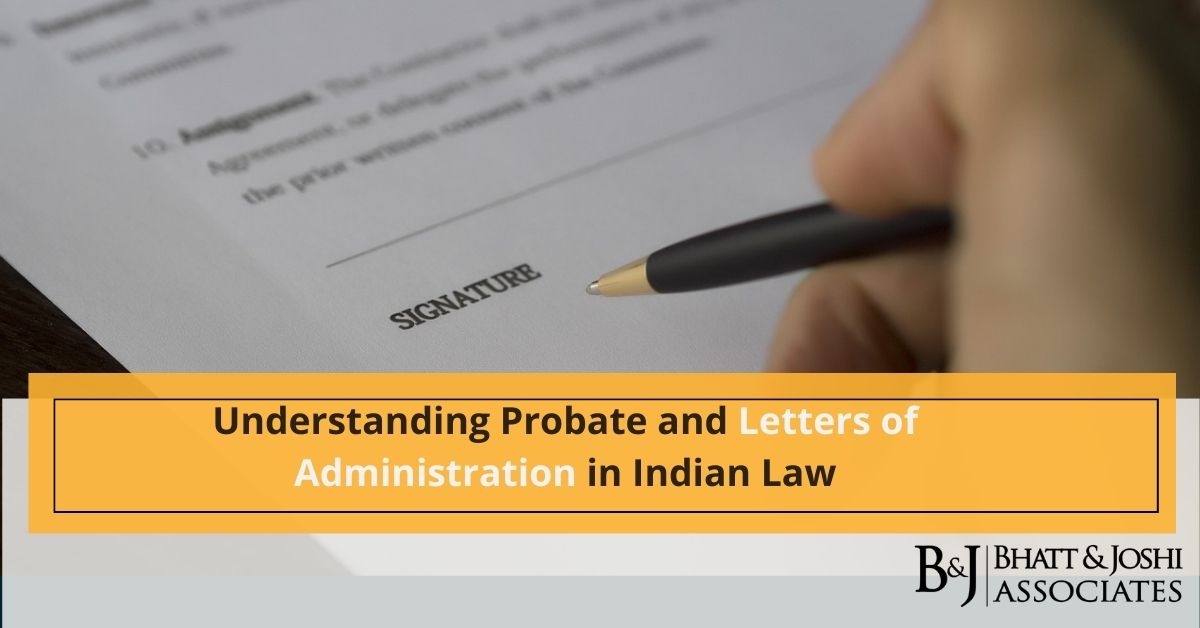Understanding Probate and Letters of Administration in Indian Law
Introduction
In the intricate tapestry of Indian law, few legal concepts are as crucial yet often misunderstood as Probate and Letters of Administration. These terms, entrenched in the realm of inheritance and succession, hold significant implications for the transfer of property and assets following an individual’s demise. In this comprehensive exploration, we delve deep into the nuances of Probate, Letters of Administration, their legal intricacies, and their profound impact within the Indian legal framework.
Probate: Unraveling its Significance
Probate, a term derived from the Latin word “probare,” meaning to prove, serves as the legal process through which the validity of a deceased person’s Will is confirmed by a court of law. When an individual passes away leaving behind a Will, the appointed executor named in the Will initiates the probate process by submitting the document to the appropriate court. The primary objective of probate is to establish the authenticity and legality of the Will, ensuring that it reflects the true intentions of the deceased. Upon receipt of the Will, the court meticulously examines its contents, scrutinizing its execution, witnessing, and compliance with legal formalities. This rigorous scrutiny is imperative to prevent fraud, coercion, or undue influence in the execution of the Will. Once the court is satisfied with the validity of the Will, it issues a Probate certificate, granting formal recognition to the executor’s authority to administer the deceased’s estate as per the instructions delineated in the Will. This certificate serves as a legal mandate, empowering the executor to undertake various tasks such as inventorying assets, paying debts and liabilities, and distributing the estate among the beneficiaries by the Will’s provisions.
Letters of Administration: Deciphering its Scope
In situations where an individual dies without leaving a Will (intestate), or if the Will fails to nominate an executor, the legal mechanism of Letters of Administration comes into play. Letters of Administration serve as a judicially sanctioned document that authorizes an administrator appointed by the court to manage and distribute the deceased person’s estate in adherence to the laws of intestate succession. The process of obtaining Letters of Administration entails a thorough examination of the deceased’s estate, verification of potential heirs, and appointment of a suitable administrator. The administrator, typically a close relative or beneficiary of the deceased, assumes responsibility for marshaling the assets, settling debts, and ultimately distributing the estate among the legal heirs in accordance with applicable laws. Unlike probate, which is contingent upon the existence of a valid Will, Letters of Administration apply universally to intestate estates, ensuring a systematic and equitable distribution of assets in the absence of testamentary instructions.
Legal Framework in India: Navigating the Indian Succession Act, 1925
In India, the probate and Letters of Administration process find their statutory foundation in the Indian Succession Act, 1925. This seminal legislation comprehensively addresses the procedural aspects and substantive principles governing testamentary and intestate succession across the country. The Indian Succession Act delineates the procedural requirements for obtaining probate and Letters of Administration, including the jurisdiction of courts, eligibility criteria for executors/administrators, and the formalities associated with asset distribution. Additionally, the Act codifies the rules governing Will execution, revocation, and interpretation, ensuring clarity and uniformity in testamentary dispositions. Furthermore, the Act incorporates provisions relating to the preservation of estates, succession certificates, and deathbed gifts, thereby encompassing a wide array of legal intricacies associated with estate administration. However, it’s essential to recognize that the applicability and nuances of probate and Letters of Administration may vary based on factors such as the location of the deceased’s assets, the presence of a valid Will, and the religious affiliation of the deceased. While probate may be mandatory for Wills executed in designated areas like Mumbai, Madras, and Kolkata, the necessity for probate may differ in other regions, exemplifying the contextual intricacies inherent in estate administration.
Probate and Letters of Administration: Navigating Challenges and Controversies
Despite their inherent significance, the probate and Letters of Administration process in India are not immune to challenges and controversies. The complexity of legal procedures, coupled with the prolonged court proceedings and associated costs, often dissuade individuals from initiating these processes, leading to delays in asset distribution and potential disputes among heirs. Moreover, the jurisdictional limitations and religious considerations further complicate matters, necessitating a nuanced understanding of applicable laws and customs. Recent legal developments, such as judicial interpretations and amendments to inheritance laws, have aimed to address some of these challenges and streamline the probate and Letters of Administration process. However, certain contentious issues, such as the recognition of Wills executed abroad, the treatment of digital assets, and the rights of adopted children, continue to evoke debate and require judicial intervention for resolution.
Future Horizons: Pioneering Reforms in Probate and Letters of Administration
As India undergoes economic and social transformations, the legal framework governing inheritance and succession must evolve to meet the dynamic needs of its populace. Efforts to simplify legal procedures, enhance accessibility to justice, and promote harmonization across diverse religious and cultural practices are essential for fostering confidence in the probate and Letters of Administration process. Moreover, raising awareness among the populace about the importance of estate planning, drafting Wills, and understanding the implications of probate and Letters of Administration can empower individuals to make informed decisions regarding their assets and legacies. In conclusion, Probate and Letters of Administration serve as indispensable mechanisms in facilitating the orderly transfer of wealth and assets from one generation to the next. By navigating the legal intricacies and ensuring compliance with statutory requirements, individuals can safeguard their interests and uphold their testamentary wishes, thereby contributing to the preservation of familial harmony and financial security in a rapidly evolving legal landscape.







